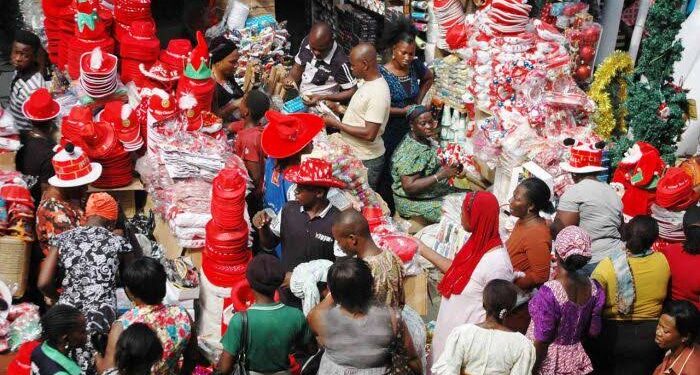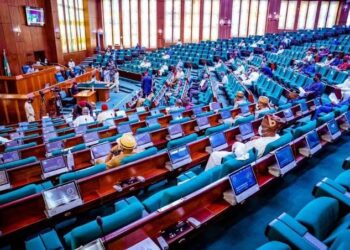*Naira Scarcity Worsens Despite CBN’s Sanction Threat to Banks
* Prices Of Food items, Meat Tripple
*Shoppers Lament As PoS Operators Raise Charges
* Nigerians Decry Alleged CBN’s Supervisory Laxity, Connivance Between Banks, PoS
*Apex bank lifts restriction on cryptocurrency transactions
John Danjuma Omachonu
With only two days left before Christmas, metrobusinessnews.com (MBN) wishes all its readers and their loved ones and indeed Nigerians, a Merry Christmas and a Happy New Year!
Christmas has a unique way of ushering in joy. But with 2023, characterized by a cocktail of mixed emotions, geopolitical tension, heightened insecurity and macroeconomic conundrums, most Nigerians would rather see this festive period as a period for sober reflection and possibly counting losses with self encouragement and renewed hope of a better tomorrow.
Despite the present challenges, most Nigerians are hopeful that better days are coming based on devine intervention as Nigerians uphold righteousness.
Amidst the echoes of the challenging year, Nigeria faced severe trials, with fields, once vibrant, facing nature’s gloom even as food scarcity looms.
This is even as Naira’s scarcity has returned, a familiar fright, most Nigerians would say.
Meanwhile, the use of digital channels surged, in the cashless night.
Meanwhile, withdrawal costs have soared, a financial fight, and in the broader economy, inflation took flight.
With less than 48 hours to the Christmas celebration, Nigerians have been left cash-strapped, while hopes of resolving prevailing naira crisis dwindles, despite Thursday’s warning by the Central Bank of Nigeria (CBN) that it was going to sanction banks and point-of-sale (PoS) operators allegedly involved in the act of sabotage.
Most Nigerians are rattled that while deposit banks ration out between N2000 and N5000 maximum to disgruntled depositors, operators of PoS are stuffed with cash but with higher charges.
This is on the heels of CBN’s lifting of its ban on transactions on crypt-currencies in the country.
Interestingly, CBN may have acknowledged sharp practices following its waning to banks and PoS operators against acts undermining availability and flow of the Naira across the country.
The bank in a statement issued by its acting Director, Corporate Communications, Mrs. Sidi-Ali Hakama, had alluded to alleged cases of collusion between banks and PoS operators which had reportedly affected the availability of cash, as well as disruption of the seamless circulation of the Naira.
But, the warning did not in anyway help consumers as PoS operators charge between 20 and 30 percent.
But more worrisome is the sowering of prices of food stuff trppling in some cases, while meat has become a no-go-area for most lower and middle income earners, with prices of chickens going between N15, 000 and N25, 000 depending on the sizes.
But, most Nigerians are not happy with the level of monitoring and supervision of banks by CBN, while urging the apex bank to improve on its monitoring and supervision of commercial banks in the country due to the worsening incidence of Naira scarcity.
The issue of cash scarcity began to creep into the economy late November and got more pronounced in December with widened cash demand for yuletide celebrations.
Metrobusinessnews.com (MBN) checks in Lagos Friday showed that the Naira scarcity has remained unabated as banks have continued to peg withdrawal limits downwards to as low as N2,000, with PoS agents coming to the rescue of desperate customers.
This is even as most banks’ ATMs were not dispensing cash, leaving customers at the mercy of shylock PoS operators
“I had to pay N200 to a PoS operator to get N5000. It’s sad this is happening to us again in a country where we have a government, it shouldn’t even be this period at all,” a customer at GTBank Berger branch lamented.
Also, at Zenith bank on Allen, Ikeja, customers could only get a maximum of N5, 000 across the counter, even as the ATMs were not dispensing.
Some PoS terminals visited by MBN were not unusually crowded, but customers were made to pay as high as five per cent on withdrawals.One of the operators at the Agege area of Lagos, who simply gave her name as Mary, said she increased her charges because of the hassle she faced in accessing the cash from banks.
Speaking to MBN, one of the customers of Polaris bank in Ikeja said:“We are only given half or a quarter of the amount we requested. We have to visit different banks to collect the little they are giving so we can have enough. It is that stressful.”
Owing to the development, Nigerians, both traders and consumers are devising means to stay afloat even though they are not finding it easy.Given the situation, most transactions at local market and organised retail stores are now consummated with electronic payment but the experiences are not too palatable for both transacting parties.
A visit to some of the markets showed unusual high footfalls, with many customers delayed further by failed electronic transactions.
Commenting on the situation, the Bank Customers Association of Nigeria (BCAN) cautioned Nigerians against lavish and unnecessary spending.President of the association, Dr. Uju Ogunbunka, said there were no signs of the crisis ending so soon.He disclosed that CBN supply of cash to commercial banks has not improved and expressed concern why it was so despite the promise by the apex bank earlier in the week to address the anomaly.
Ogunbunka said, “The CBN has a mandate to promote a sound financial system which includes producing and distributing cash across the country in a way that will be sufficient for all.“That this is happening is very sad and sadder at a festive period when physical cash is a priority. The apex bank should not put us in further trouble and avoid stirring unnecessary sufferings on the masses.“If there is any issue, let them communicate appropriately so Nigerians can guard and prepare ahead. Nigerians have the right to know the truth.“As much as we know that digital transactions can be substituted for cash, it cannot entirely play the role of physical cash. Even a merchant who accepts transfer for goods would still find himself in a position of needing cash,” he said.
On his part, Lagos based analyst, while berating CBN for the the lingering Naira scarcity and describing it as economic sabotage, said, “From all logical deductions and calculations,there is no basis for scarcity, except there is a deliberate act of sabotage. The CBN has a responsibility to investigate and identify those behind this.”
“Particularly, businesses in the distributive trade, informal and intra-city transport sector have been affected. Moreover, some elements in the cash distribution chain are taking advantage of the scarcity to sell Naira notes at between 10 per cent and 20 per cent premium.
“The CBN and the security agencies must put an end to this racket,” he said.
CBN Lifts Restriction on Cryptocurrency Transactions
Meanwhile, CBN has lifted its ban on transactions on crypt-currencies in the country.
The central bank disclosed this in a circular dated December 22, 2023, signed by the Director, Financial Policy and Regulation Department, Haruna Mustafa.
The document titled, ‘Circular to all Banks and other Financial Institutions Guidelines on Operations of Bank Accounts for Virtual Assets Service Providers (VASPS),’ was addressed to the banks
ALSO READ:OPEC’s Power Weakens As Angola Quits Cartel, Oil Prices Are Falling
It noted that its decision was informed by current trends globally which showed the need for crypto-regulation.
“The CBN in February 2021 issued a circular restricting banks and other financial institutions from operating accounts for cryptocurrency service providers in view of the money laundering and terrorism financing (ML/TF) risks and vulnerabilities inherent in their operations as well as the absence of regulations and consumer protection measures.
“However, current trends globally have shown that there is need to regulate the include providers (V/ASPs) which activities of virtual assets service cryptocurrencies and crypto assets. Following this development, the Financial Action Task Force (FATF) in 2018 also updated its Recommendation 15 to require VASPs to be regulated to prevent misuse of virtual assets for ML/TF/PF Furthermore, Section 30 of the Money Laundering (Prevention and Prohibition) Act, 2022 recognizes VASPs as part of the definition of a financial institution.
“In addition, the Securities and Exchange Commission in May 2022, issued Rules on Issuance, Offering and Custody of Digital Assets and VASPs to provide a regulatory framework for their operations in Nigeria.
“In view of the foregoing, the CBN hereby issues this guideline to provide guidance to financial institutions under its regulatory purview in respect of their banking relationship with VASPs in Nigeria,“ it added.
The apex bank noted that the new guidelines supersede it’s a previous one with reference number FPR/DIR/GEN/CIR/06/010 of January 12, 2017, and BSD/DIR/PUB/LAB/014/001 of February 5, 2021 on the subject.













